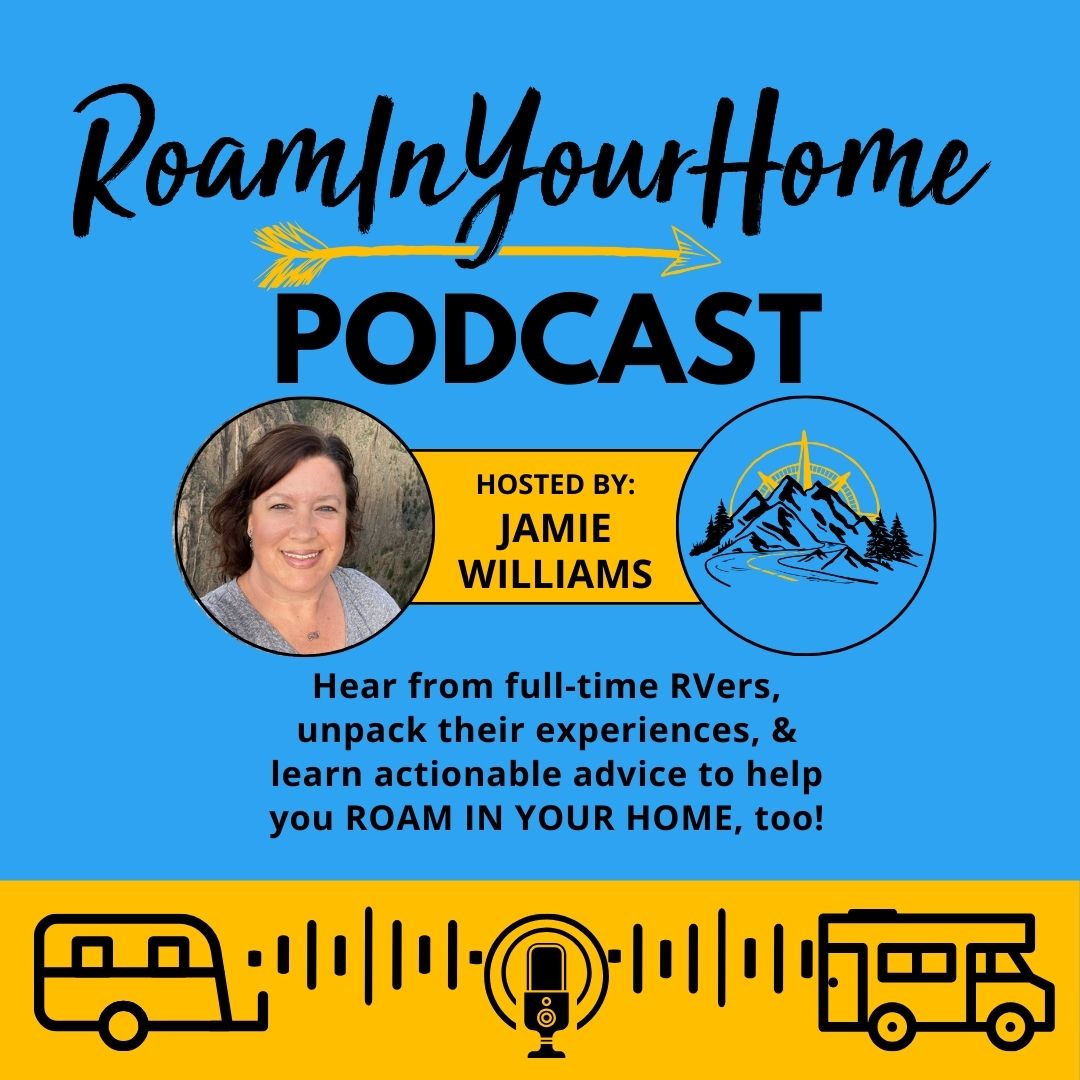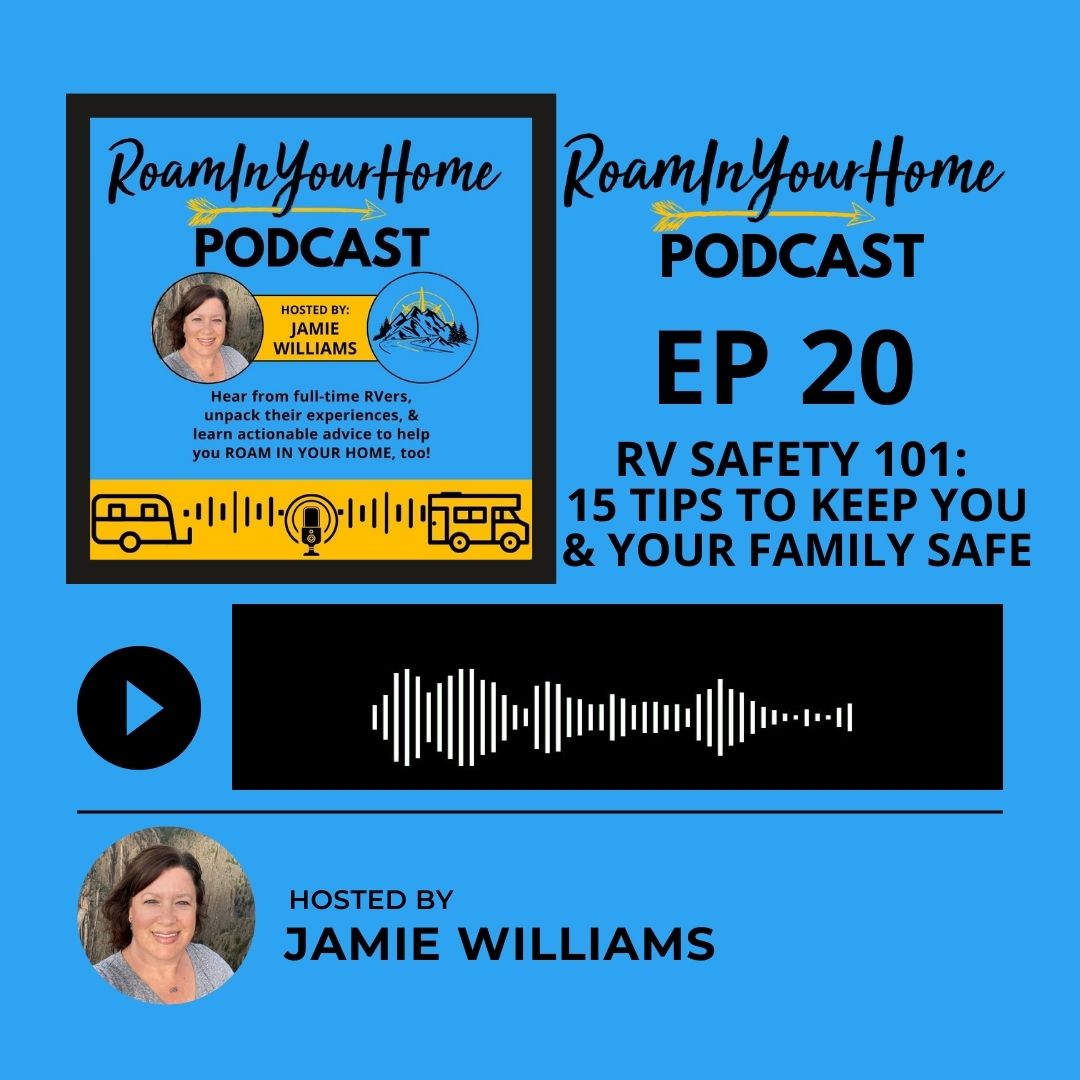

EPISODE 20 - RV Safety 101: 15 tips to keep you & your family safe
Would you love to roam the country in your home on wheels, traveling in an RV? We ask full-time RVers all the questions and get all the answers you want to know. We'll unpack their experiences and learn actionable advice to help you get started.
Today’s episode is going to be different from the others. I hope you listen, take notes, relisten, and share it with others. This episode just may save your life.
Last week, there was a tragic event in the RV community, and I honestly can’t stop thinking about it. I’m a subscriber to Drivin and Vibin’s email newsletter, and they recently sent a link to their latest blog post published on Monday, June 24th. It was breaking news about a Missouri couple, Gary & Mary Weaver, who were attacked on June 19th at a Nebraska rest area on I-80. Randy and I travel I-80 many times and have most likely stopped at this same rest area. Dashcam footage from a nearby semi-truck shows a 22-year-old assailant demanding keys to their Jeep, breaking into their RV, and brutally murdering Gary by stabbing him to death. He then went outside and attacked Mary. The Hall County Sheriff’s office arrived on the scene to find the couple bleeding from their knife wounds and transported them to Grand Island Hospital. It was there that Gary was pronounced dead, and Mary remains in critical condition.
While RVing can generally be safe, there are specific precautions RVers can take to reduce the risk of being attacked like Gary & Mary. Here are 15 tips to maximize your safety and help prevent being in a similar situation:
- Choose Safe Locations: Avoid overnight stays at isolated rest areas. Opt for well-lit, busy, and reputable campgrounds or RV parks with good reviews.
- Install Security Systems: Consider installing security cameras and alarm systems in your RV. Motion-activated lights can also deter intruders.
- Lock Doors and Windows: Always lock all doors and windows when inside the RV, especially at night. Consider additional locks or reinforcements for extra security.
- Stay Alert: Be aware of your surroundings. If something or someone seems suspicious, trust your instincts and move to a safer location.
- Use Safety Apps: Use apps that allow you to share your location with family or friends. Some apps also have emergency alert features.
- Keep Valuables Hidden: Keep valuables out of sight to avoid attracting unwanted attention.
- Personal Defense Tools: Consider keeping personal defense tools like pepper spray, a loud whistle, or a personal alarm within reach.
- Emergency Plans: Have an emergency plan in place. Know how to quickly exit the RV and where to go in case of an emergency.
- Training: Consider taking self-defense classes to learn how to protect yourself in dangerous situations.
- Travel in Groups: Whenever possible, travel with other RVers. There is safety in numbers.
- Regular Check-Ins: Regularly check in with family or friends, letting them know your location and plans.
- Engage with the Community: Build connections with other RVers and campground staff. Being part of a community can provide support and additional security.
- Limit Stops: Limit your stops at rest areas to daytime hours when they are more likely to be busy. Avoid staying overnight at rest stops.
- Park Strategically: Park in well-lit areas close to other RVs or buildings. Avoid parking in secluded or dark areas.
- Stay Connected: Keep a charged phone with emergency contacts and local law enforcement numbers easily accessible.
By taking these precautions, you will maximize your safety and reduce your risk of becoming victims. It's impossible to eliminate all risks, but being proactive and prepared can significantly improve your safety while traveling in an RV.
In addition to these safety tips, it’s also important to consider some other essential aspects for keeping you safe:
- Weather Preparedness: Be diligent about checking the weather and definitely get a weather radio. We recently purchased one, and honestly, no one should ever RV without one. The weather can change in an instant, and you don’t want to be asleep and unprepared.
- Health Emergencies: It’s a good routine to get into to always look up where the closest ER and hospital are when you get to a new location. If you have animals, know where the nearest emergency vet is. Just get in the habit of looking these things up when you get to a new place, writing them down, and putting them somewhere that everyone can easily find them.
- First Aid Kit, Medical Supplies, and Fire Extinguisher: Not only have these things but know how to use them. If you have kids, teach them how to use them too.
If this episode even just has you thinking more about your safety and making it more of a priority like it has for me, then I’ve done my job. I know that Randy and I will definitely be making some changes as we travel. We’ve been full-time for seven years now, and because we’ve never been in a bad situation, it’s easy to get lazy and lax about safety. Hindsight is 20/20, and this is absolutely something you don’t want to learn the hard way. You will never regret being too safe, but you will never want to live with the regret that something happened because you didn’t make the effort to be safe.
We'd love to connect with you! Find us on all social media @roaminyourhome and visit our website at Roam In Your Home. Come back next week for another fun adventure!
Music from #Uppbeat (free for Creators!):
